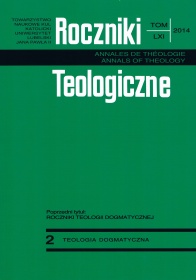Organism and Revival: the Myth of the World Without Illnesses
Abstract
From the truth about the creation of man it follows that man was called upon to live a life without an end. This transcendental dimension of man’s being, however, may be lost, if it is realized only in the perspective of earthly finiteness. This puts two important questions: is such a perspective possible at all, and would such a kind of life be desirable? Assuming that it would be possible, it should not, however, be desirable, because it would destroy the personal dimension of our being. The contingent character of the human being issues actual challenges to medicine. The response to them depends on the way science is understood. Today science is often understood not in the Aristotelian meaning (cognition and contemplation of the truth), but in the technical meaning, as ruling the world and trying to changing it. This carries actual dangers to man in the sphere of morality, along with socialcultural consequences. A man of science, however, has to recognize some impassable borders: the contingency of the human being cannot be eliminated, and man’s role cannot be reduced to that of an object saving others. Science cannot deceive us with the myth of the world devoid of suffering, illnesses and death. In consequence medicine not only is to heal people, but also to accompany man in the case when there is no hope of regaining his health. The example of Socrates may serve as a paradigm of man’s relation towards life and death.
Copyright (c) 2014 Roczniki Teologiczne

This work is licensed under a Creative Commons Attribution-NonCommercial-NoDerivatives 4.0 International License.





